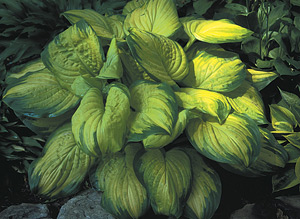
Crinkle power - 'Stained Glass' hosta's thick, crinkly leaves protect against slug damage. © Photo courtesy Walters Gardens
When it comes to the shade, few perennials work as well as Hosta.
We appreciate hosta for its foliage, which comes in a wide range of green and blue hues or with the leaves variegated, edged or splotched with color. The flowers, called scapes, are almost secondary, even though several cultivars are extremely fragrant.
And while we appreciate the leaves, slugs call them dinner. The slugs eat holes in the leaves, giving them the look of Swiss cheese. Slugs work at night. A trip with a flashlight outdoors after dark will confirm the presence of a slug, a generic name for terrestrial gastropod mollusks.
Here are some tips for controlling slugs from Randy Goodwin, a retired teacher with more than 1,200 hostas in his Boone County landscape.
Habitat
Slugs like hiding places, so fall and spring clean up and regular removal of fallen leaves and other plant debris help eliminate conditions they find favorable.
Along the same vein, encourage the birds, frogs and other predatory creatures to dine on the slugs with diverse plantings and reduced use of pesticides. If there are no bugs, birds and frogs won’t inhabit your garden.
Controls
Place a dampened newspaper, a board or an inverted grapefruit rind in the garden at night. In the morning, you’ll find slugs gathered on the underside of the items.
Baits
There are several, including organic products, such as Sluggo or Escar-Go brands. Use of bait requires caution, because some are poisonous to pets. Always read and follow the label directions.
Another popular bait is beer. Fill a shallow can or plastic tub with beer and sink so the rim is at ground level in an area where you have slugs. The slugs crawl into the yeasty brew and drown.
Lastly, consider hosta cultivars that have some resistance to slug damage. These are usually thicker leaved hostas, says Mary Walters, of Great Garden Plants (www.greatgardenplants.com). Among her recommendations: ‘Sum and Substance,’ ‘June’ and ‘Stained Glass.’
You can learn more about hostas, 11 a.m. to 3 p.m. Sunday, Aug. 3, 2008, at the Indianapolis Hosta Society’s annual sale in the parking lot at the F.C.Tucker Carmel office, 1119 Keystone Way. The sale features more than 100 kinds of hostas and dozens of companion plants. For more information, www.indianapolishostasociety.org